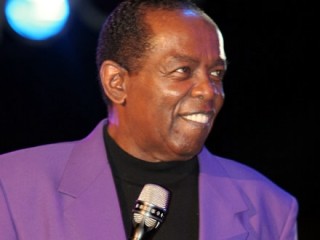
Lou Rawls biography
Date of birth : 1933-12-01
Date of death : 2006-01-06
Birthplace : Chicago, Illinois, United States
Nationality : American
Category : Famous Figures
Last modified : 2011-09-19
Credited as : soul jazz singer, How Great Thou Art,
0 votes so far
Born in Chicago in 1933, Rawls was raised by his paternal grandmother on the city's South Side. He began his singing career as a child in the choir of his grandmother's church. Rawls' singing soon attracted attention in the Chicago area. He was friends with future soul singing star Sam Cooke from childhood. The pair were members of the local group Teenage Kings of Harmony before Rawls joined another local gospel group, the Holy Wonders. From 1951 to 1953, Rawls replaced Cooke in the Highway QC's, another Chicago-based group.
In 1953, Rawls moved on to a national group, joining the Chosen Gospel Singers and moving to Los Angeles. With them, Rawls recorded for the first time in 1954. He soon joined another gospel group, the Pilgrim Travelers, also with Cooke. His time with the group was interrupted when he joined the Army as a paratrooper in 1955. He returned to the Pilgrim Travelers upon his discharge and continued to record and tour.
Rawls' life was profoundly changed in 1958 when he was involved in a car accident while touring with the Pilgrim Travelers. Riding with Cooke and his driver, Rawls suffered a severe concussion and nearly died. He remained in a coma for several days. When he awoke and spent the next year recovering, Rawls had a new perspective on life.
By 1959, the Pilgrim Travelers had broken up and Rawls was working on a solo career. Moving away from gospel and into more secular forms of music, he recorded a few solo singles for the small Candix Label. A performance at a West Hollywood coffee shop caught by producer Nick Venet led to a deal with Capitol Records. His first album, I'd Rather Drink Muddy Water (also known as Stormy Monday ) was released in 1962 and featured standards in the jazz and blues genres. Rawls then recorded two soul records, Tobacco Road and Lou Rawls Soulin '.
The prime years of Rawls' singing career came in the 1960s and 1970s when he focused primarily on R&B and pop. He developed an unusual quirk in his live performances by talking over the song as the band played while weaving the song into his monologue. Matt Schudel of the Washington Post quoted Rawls as explaining the origins of this phenomenon: "I was working in small clubs and coffeehouses. I'd be up there trying to sing, and people were talking so loud. So to get their attention, instead of singing, I'd start reciting the words to songs. Then I started making up little stories about the song and what it was relating to."
Rawls displayed his live prowess on the hit 1966 album, Lou Rawls Live! , which was recorded in the studio with an audience. That year, he had his first number one R&B single, "Love Is a Hurtin' Thing." The single "Dead End Street" earned him his first Grammy in 1967. Signing with a new label, MGM, Rawls moved more into the pop genre. The 1971 album A Natural Man earned him a second Grammy. Later in the 1970s, Rawls signed with the Philadelphia International label. The collaboration with the label's premier songwriter/producers Kenny Gramble and Leon Huff resulted in Rawls' biggest hit, "You'll Never Find (Another Love Like Mine)." This disco-tinged ballad reached number two on the pop charts and number one on the R&B charts in 1976. Rawls had another hit in 1977 with "Lady Love" from the platinum album All Things In Time . He earned his third Grammy for the 1977 platinum album Unmistakably Lou . Rawls had a few other hits with Philadelphia International, including 1979's "Let Me Be Good to You" and 1987's "I Wish You Belonged to Me."
By the mid-1970s, Rawls career expanded to include television work. In 1976, he became the spokesperson for Anheuser-Busch and did voicework for their commercials. Four years later, Rawls launched the Parade of Stars Telethon to raise money for the United Negro College Fund for scholarships for students at historically black colleges. The annual event, hosted by Rawls and sponsored by the beer company, raised more than $200 million over 25 years.
A frequent television talk show guest in the 1970s, Rawls also appeared as an actor in both film and television and worked as a voice artist in cartoons and commercials. Rawls appeared in about 20 films, including Leaving Las Vegas and Anchorman , and had roles on live action television series like Baywatch Nights . He lent his voice to such animated series as Garfield, Fatherhood , and Hey, Arnold! .
Rawls also continued to record. In the 1990s, he focused primarily on jazz and blues. In addition to 1993's Portrait of the Blues , Rawls recorded three albums for the Blue Note jazz label in the late 1980s to early 1990s. He had his first hit in more than a decade with "At Last" in 1989, which was a number-one hit on the jazz charts. In the early 2000s, Rawls also began recording gospel albums again, including 2003's How Great Thou Art .
In 2004, Rawls was diagnosed with lung cancer; a year later, brain cancer was discovered in his body. The diseases ended his performing career, which was still going strong in 2005. He died in Los Angeles, California, on January 6, 2006, at the age of 72. Rawls is survived by his third wife, Nina Malek Inman; his sons, Lou Jr. and Aiden; his daughters, Louanna and Kendra; and four grandchildren.
















